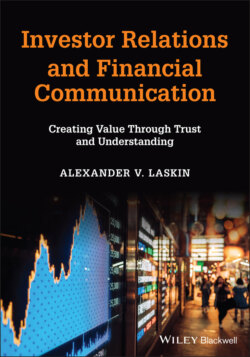Читать книгу Investor Relations and Financial Communication - Alexander V. Laskin - Страница 17
Ethics and Professionalism
ОглавлениеNIRI and other professional organizations play an important role in developing and promoting an ethical and professional code of conduct for investor relations professionals. NIRI’s investor relations Code of Conduct consists of 12 points:
1 Maintain my integrity and credibility by practicing investor relations in accordance with the highest legal and ethical standards.
2 Avoid even the appearance of professional impropriety and act as an advisor to colleagues to avoid unethical, questionable, or inappropriate behavior or situations.
3 Recognize that the integrity of the capital markets is based on transparency of relevant financial and non-financial corporate information, and will to the best of my ability and knowledge work to ensure that my company or client fully and fairly discloses this important information.
4 Provide analysts, institutional and individual investors, and the media fair and equal access to corporate information.
5 Honor my obligation to serve the interest of shareholders and other stakeholders.
6 Discharge my responsibilities completely and competently by keeping myself abreast of the affairs of my company or client as well as the laws and regulations affecting the practice of investor relations.
7 Maintain the confidentiality of information acquired in the course of my work for my company or client company.
8 Not use confidential information acquired in the course of my work for my personal advantage nor for the advantage of related parties.
9 Exercise independent judgment in the conduct of my duties and responsibilities on behalf of my company or client.
10 Avoid any professional/business relationships that might affect, or be perceived to potentially affect, my ethical practice of investor relations.
11 Report to appropriate company authorities if I suspect or recognize fraudulent or illegal acts within the company.
12 Represent myself in a reputable and dignified manner that reflects the professional stature of investor relations, and comply with the provisions of NIRI’s Participation and Engagement Code of Conduct and NIRI’s eGroups Code of Conduct.
Although NIRI does not have much power to enforce these ethical guidelines, the association can terminate the membership of anyone who is found in violation of these principles and who has been sanctioned by government agencies or judicial bodies. NIRI also maintains an Ethics Council that can provide guidance to IROs on issues involving ethical decision-making, offer educational opportunities, and develop recommendations to NIRI’s Board of Directors.
Financial communicators engaged in other aspects of the communication industry outside of investor relations often belong to other professional organizations with their own training resources, accreditation processes, and codes of ethical and professional conduct. For example, many financial communication professionals in the banking sector are members of the Financial Communications Section of the PRSA. The PRSA Code of Ethics focuses on six professional values:
1 Advocacy. We serve the public interest by acting as responsible advocates for those we represent. We provide a voice in the marketplace of ideas, facts, and viewpoints to aid informed public debate.
2 Honesty. We adhere to the highest standards of accuracy and truth in advancing the interests of those we represent and in communicating with the public.
3 Expertise. We acquire and responsibly use specialized knowledge and experience. We advance the profession through continued professional development, research, and education. We build mutual understanding, credibility, and relationships among a wide array of institutions and audiences.
4 Independence. We provide objective counsel to those we represent. We are accountable for our actions.
5 Loyalty. We are faithful to those we represent, while honoring our obligation to serve the public interest.
6 Fairness. We deal fairly with clients, employers, competitors, peers, vendors, the media, and the general public. We respect all opinions and support the right of free expression.
NIRI's Code of Conduct and PRSA's Code of Ethics, as well as codes of related professional associations, have quite a few things in common. First of these is the purpose of investor relations and financial communication. This purpose is more than just serving the management who signs the IRO's paycheck. Investor relations professionals have a broader responsibility to the shareholders, and to society, in general. Shareholders in the company are the highest authority in publicly traded companies as they are the ones who appoint the Board of Directors, who, in turn, appoints the CEO. Thus, the responsibility of the IRO is to the company and its shareholders, not to the CEO. Tesla is more than just Elon Musk and Facebook is more than just Mark Zuckerberg.
In addition, as discussed earlier, investor relations is one of the key providers of timely and accurate information to the financial markets and this serves as the basis of modern capitalist society. Investors cannot invest without knowledge and understanding of what they are investing in, and companies won’t have sufficient capital to grow and expand without these investments. This can bring the whole economy to a halt. Thus, IROs serve the economy in general.
Another important point that these ethical guidelines make is the necessity for independence and expertise. This means that investor relations and financial communication professionals have a unique set of knowledge and skills that others do not necessarily have. Thus, it is important for them to be able to make their own judgment on what the proper course of action is in various situations. IROs should not be delegated only technical tasks of writing news releases or updating websites – they need to be able to implement proactive strategic decisions about what needs to be done, when, and why. In the same way as the CEO of a hospital should not tell a surgeon how to operate, the CEO of a corporation should not tell the IROs how to perform their investor relations functions.
